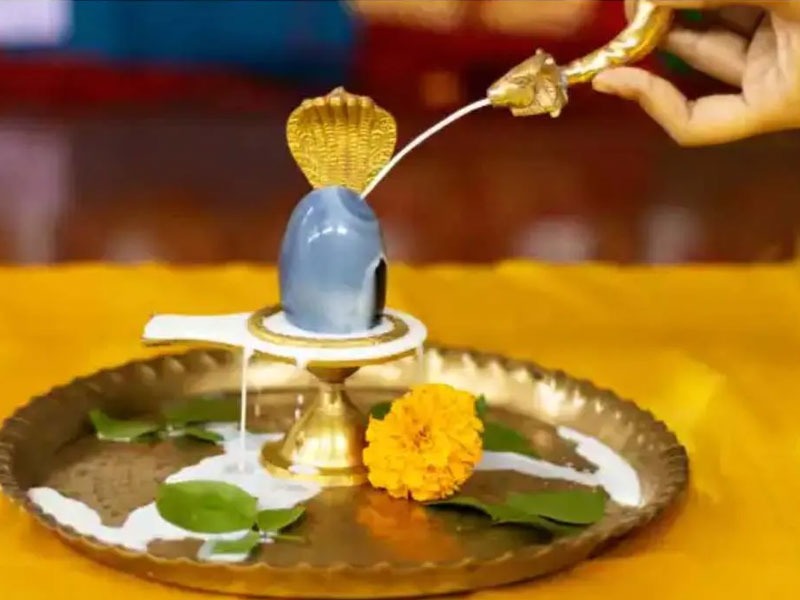
Rudra Abhishek is a sacred Hindu ritual performed to honor Lord Shiva in his fierce form as Rudra. The puja involves bathing the Shiva Linga with various holy substances like milk, honey, ghee, curd, water, and sugar, accompanied by chanting of Rudram Mantras. This ritual is believed to remove negative energies, grant prosperity, health, peace, and spiritual growth. Rudra Abhishek is often performed on Mondays, Maha Shivratri, or special occasions for fulfilling wishes and gaining divine blessings.Rudra Abhishek is a sacred Hindu ritual performed to honor Lord Shiva in his fierce form as Rudra. The puja involves bathing the Shiva Linga with various holy substances like milk, honey, ghee, curd, water, and sugar, accompanied by chanting of Rudram Mantras. This ritual is believed to remove negative energies, grant prosperity, health, peace, and spiritual growth. Rudra Abhishek is often performed on Mondays, Maha Shivratri, or special occasions for fulfilling wishes and gaining divine blessings.
• Worship of Lord Shiva in the form of Rudra
• Ritual bathing (Abhishek) of the Shiva Linga with milk, honey, ghee, curd, water, and sugar
• Chanting of Rudram Mantras and Shiva Stotras
• Lighting of lamps (Diya) and incense sticks (Agarbatti)
• Offering flowers, bilva leaves, and fruits to the deity
• Performing Aarti after the Abhishek
• Belief in removal of negative energies and fulfillment of desires
• Performed individually, in temples, or at home
• Often conducted on Mondays, Maha Shivratri, or special religious occasions
• Distribution of prasad to devotees• Worship of Lord Shiva in the form of Rudra@• Ritual bathing (Abhishek) of the Shiva Linga with milk, honey, ghee, curd, water, and sugar@• Chanting of Rudram Mantras and Shiva Stotras@• Lighting of lamps (Diya) and incense sticks (Agarbatti)@• Offering flowers, bilva leaves, and fruits to the deity@• Performing Aarti after the Abhishek@• Belief in removal of negative energies and fulfillment of desires@• Performed individually, in temples, or at home@• Often conducted on Mondays, Maha Shivratri, or special religious occasions@• Distribution of prasad to devotees
Samagri
• Shiva Linga or picture of Lord Shiva
• Milk, water, honey, ghee, curd, sugar (for Abhishek)
• Bilva (Bel) leaves
• Flowers (especially white and red flowers)
• Fruits for offering
• Incense sticks (Agarbatti)
• Lamp (Diya) with ghee or oil
• Kalash (holy water pot)
• Coconut
• Rice grains (Akshata)
• Sandalwood paste
• Kumkum (vermilion) and turmeric
• Bell (Ghanti) and conch (Shankh)
• Panchamrit (milk, curd, honey, ghee, sugar)
• Cloth or decorative fabric for altar
• Holy water (Ganga jal)• Shiva Linga or picture of Lord Shiva@• Milk, water, honey, ghee, curd, sugar (for Abhishek)@• Bilva (Bel) leaves@• Flowers (especially white and red flowers)@• Fruits for offering@• Incense sticks (Agarbatti)@• Lamp (Diya) with ghee or oil@• Kalash (holy water pot)@• Coconut@• Rice grains (Akshata)@• Sandalwood paste@• Kumkum (vermilion) and turmeric@• Bell (Ghanti) and conch (Shankh)@• Panchamrit (milk, curd, honey, ghee, sugar)@• Cloth or decorative fabric for altar@• Holy water (Ganga jal)
Rudra Abhishek
Pay Now
Change of Plan ? Kalkipuja has you covered !
Cancel upto 48 hours before event & get full refund OR reschedule with ease


